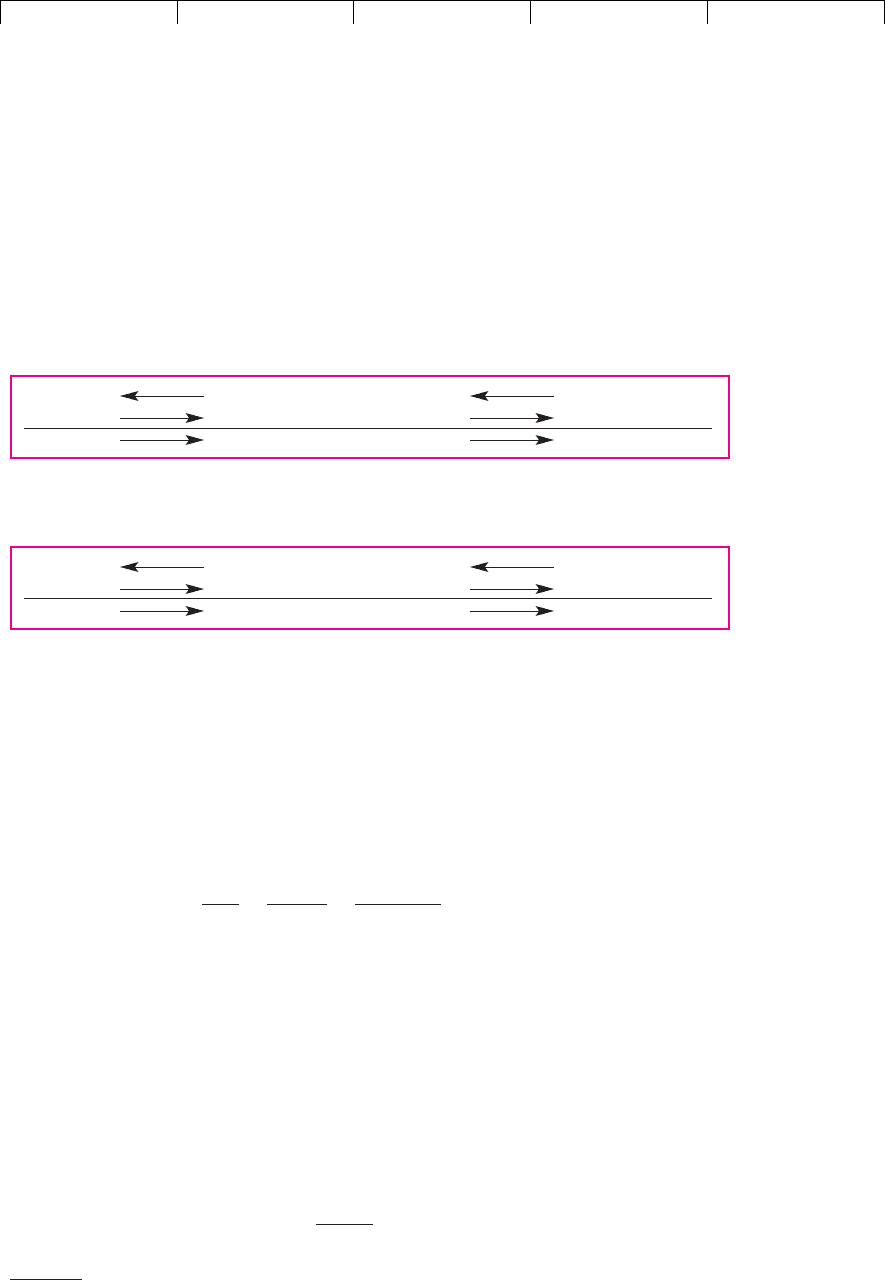Brealey, Myers. Principles of Corporate Finance. 7th edition
Подождите немного. Документ загружается.


Brealey−Meyers:
Principles of Corporate
Finance, Seventh Edition
VIII. Risk Management 27. Managing Risk
© The McGraw−Hill
Companies, 2003
the same amount at LIBOR. We assume that LIBOR is initially 5 percent.
22
LIBOR
is a short-term interest rate, so future interest receipts will fluctuate as the bank’s
investment is rolled over.
The net cash flows to this strategy are shown in the top portion of Table 27.3. No-
tice that there is no net cash flow in year 0 and that in year 5 the principal amount
of the short-term investment is used to pay off the $66.67 million loan. What’s left?
A cash flow equal to the difference between the interest earned
and the $4 million outlay on the fixed loan. The bank also has $4 million per year
coming in from the project financing, so it has transformed that fixed payment into
a floating payment keyed to LIBOR.
Of course, there’s an easier way to do this, shown in the bottom portion of
Table 27.3. The bank can just enter into a five-year swap.
23
Naturally, Friendly
Bancorp takes this easier route. Let’s see what happens.
Friendly Bancorp calls a swap dealer, which is typically a large commercial or
investment bank, and agrees to swap the payments on a $66.67 million fixed-rate
loan for the payments on an equivalent floating-rate loan. The swap is known as a
fixed-to-floating interest rate swap and the $66.67 million is termed the notional
principal amount of the swap. Friendly Bancorp and the dealer are the counterpar-
ties to the swap.
The dealer is quoting a rate for five-year swaps of 6 percent against LIBOR.
24
This figure is sometimes quoted as a spread over the yield on U.S. Treasuries. For
1LIBOR 66.672
766 PART VIII
Risk Management
22
Maybe the short-term interest rate is below the five-year interest rate because investors expect inter-
est rates to rise.
23
Both strategies are equivalent to a series of forward contracts on LIBOR. The forward prices are $4 mil-
lion each for , and so on. Separately negotiated forward prices would not
be $4 million for any one year, but the PVs of the “annuities” of forward prices would be identical.
24
Notice that the swap rate always refers to the interest rate on the fixed leg of the swap. Rates are gen-
erally quoted against LIBOR, though dealers will also be prepared to quote rates against other short-
term debt.
LIBOR
1
66.67, LIBOR
2
66.67
Year
01 2 345
Homemade swap:
1. Borrow $66.67 at
6% fixed rate 66.67 4 4 4 4 (4 66.67)
2. Lend $66.67 at 66.67 .05 66.67 LIBOR
1
LIBOR
2
LIBOR
3
LIBOR
4
LIBOR floating rate 66.67 66.67 66.67 66.67 66.67
Net cash flow 0 4.05 4 LIBOR
1
4 LIBOR
2
4 LIBOR
3
4 LIBOR
4
66.67 66.67 66.67 66.67 66.67
Standard fixed-to-floating swap:
Net cash flow 0 4 .05 4 LIBOR
1
4 LIBOR
2
4 LIBOR
3
4 LIBOR
4
66.67 66.67 66.67 66.67 66.67
TABLE 27.3
The top panel shows the cash flows to a homemade fixed-to-floating interest rate swap. The bottom panel shows the
cash flows to a standard swap transaction.

Brealey−Meyers:
Principles of Corporate
Finance, Seventh Edition
VIII. Risk Management 27. Managing Risk
© The McGraw−Hill
Companies, 2003
example, if the yield on five-year Treasury notes is 5.25 percent, the swap spread is
.75 percent.
25
The first payment on the swap occurs at the end of year 1 and is based on the
starting LIBOR rate of 5 percent.
26
The dealer (who pays floating) owes the bank
5 percent of $66.67 million, while the bank (which pays fixed) owes the dealer
$4 million (6 percent of $66.67 million). The bank therefore makes a net payment
to the dealer of million:4 1.05 66.672 $
ˇ .67
CHAPTER 27 Managing Risk 767
25
Swap spreads fluctuate. After Russia defaulted on its debt in 1998 and the U.S. hedge fund Long
Term Capital Management (LTCM) came close to collapse, five-year swap spreads nearly doubled
from 0.5 percent to 0.8 percent.
26
More commonly, interest rate swaps are based on three-month LIBOR and involve quarterly cash
payments.
Bank .05 $66.67 $3.33 Counterparty
Bank $4 Counterparty
Bank Net $.67 Counterparty
The second payment is based on LIBOR at year 1. Suppose it increases to 6 percent.
Then the net payment is zero:
Bank .06 $66.67 $4 Counterparty
Bank $4 Counterparty
Bank Net 0 Counterparty
The third payment depends on LIBOR at year 2, and so on.
Notice that, when the two counterparties entered into the swap, the deal was
fairly valued. In other words, the net cash flows had zero present value. What hap-
pens to the value of the swap as time passes? That depends on long-term interest
rates. For example, suppose that after two years interest rates are unchanged, so a
6 percent note issued by the bank would continue to trade at its face value. In this
case the swap still has zero value. (You can confirm this by checking that the NPV
of a new three-year homemade swap is zero.) But if long rates increase over the two
years to 7 percent (say), the value of a three-year note falls to
Now the fixed payments that the bank has agreed to make are less valuable and
the swap is worth million.
How do we know the swap is worth $1.75 million? Consider the following strategy:
1. The bank can enter a new three-year swap deal in which it agrees to pay
LIBOR on the same notional principal of $66.67 million.
2. In return it receives fixed payments at the new 7 percent interest rate, that
is, per year.
The new swap cancels the cash flows of the old one, but it generates an extra.
$.67 million for three years. This extra cash flow is worth
PV
a
3
t1
.67
11.072
t
$ˇ 1.75 million
.07 66.67 $ˇ 4.67
66.67 64.92 $
ˇ 1.75
PV
4
1.07
4
11.072
2
4 66.67
11.072
3
$ˇ 64.92 million

Brealey−Meyers:
Principles of Corporate
Finance, Seventh Edition
VIII. Risk Management 27. Managing Risk
© The McGraw−Hill
Companies, 2003
Remember, ordinary interest rate swaps have no initial cost or value ),
but their value drifts away from zero as time passes and long-term interest rates
change. One counterparty wins as the other loses.
In our example, the swap dealer loses from the rise in interest rates. Dealers will
try to hedge the risk of interest rate movements by engaging in a series of futures
or forward contracts or by entering into an offsetting swap with a third party. As
long as Friendly Bancorp and the other counterparty honor their promises, the
dealer is fully protected against risk. The recurring nightmare for swap managers
is that one party will default, leaving the dealer with a large unmatched position.
This is called counterparty risk.
Currency Swaps
We now look briefly at an example of a currency swap.
Suppose that the Possum Company needs 11 million euros to help finance its Euro-
pean operations. We assume that the euro interest rate is about 5 percent, whereas the
dollar rate is about 6 percent. Since Possum is better known in the United States, the fi-
nancial manager decides not to borrow euros directly. Instead, the company issues
$10 million of five-year 6 percent notes in the United States. Then it arranges with a
counterparty to swap this dollar loan into euros. Under this arrangement the counter-
party agrees to pay Possum sufficient dollars to service its dollar loan, and in exchange
Possum agrees to make a series of annual payments in euros to the counterparty.
Here are Possum’s cash flows (in millions):
1NPV 0
768 PART VIII
Risk Management
Year 0 Years 1– 4 Year 5
Dollars Euros Dollars Euros Dollars Euros
1. Issue dollar loan 10 .6 10.6
2. Swap dollars for euros 10 11 .6 .55 10.6 11.55
3. Net cash flow 0 11 0 .55 0 11.55
Look first at the cash flows in year 0. Possum receives $10 million from its issue of
dollar notes, which it then pays over to the swap counterparty. In return the coun-
terparty sends Possum a check for a11 million. (We assume that at current rates of
exchange $10 million is worth a11 million.)
Now move to years 1 through 4. Possum needs to pay interest of 6 percent on its
debt issue, which works out at million. The swap counterparty
agrees to provide Possum each year with sufficient cash to pay this interest and in
return Possum makes an annual payment to the counterparty of 5 percent of
a11 million, or a.55 million. Finally, in year 5 the swap counterparty pays Possum
enough to make the final payment of interest and principal on its dollar notes
($10.6 million), while Possum pays the counterparty a11.55 million.
The combined effect of Possum’s two steps (line 3) is to convert a 6 percent dol-
lar loan into a 5 percent euro loan. You can think of the cash flows for the swap
(line 2) as a series of contracts to buy euros in years 1 through 5. In each of years
1 through 4 Possum agrees to purchase $.6 million at a cost of .5 million euros; in
year 5 it agrees to buy $10.6 million at a cost of 11.55 million euros.
27
.06 10 $ˇ .6
27
Usually in a currency swap the two parties make an initial payment to each other (i.e., Possum pays
the bank $10 million and receives a11 million). However, this is not necessary and Possum might pre-
fer to buy the a11 million from another bank.

Brealey−Meyers:
Principles of Corporate
Finance, Seventh Edition
VIII. Risk Management 27. Managing Risk
© The McGraw−Hill
Companies, 2003
Credit Derivatives
In recent years there has been considerable growth in the use of credit derivatives,
which protect lenders against the risk that a borrower will default. For example,
bank A may be reluctant to refuse a loan to a major customer (customer X) but may
be concerned about the total size of its exposure to that customer. Bank A can go
ahead with the loan, but use credit derivatives to shuffle off the risk to bank B.
The most common credit derivative is known as a default swap. It works as fol-
lows. Bank A promises to pay a fixed sum each year to B as long as company X has
not defaulted on its debts. If X defaults, B compensates A for the loss, but otherwise
pays nothing. Thus you can think of B as providing A with long-term insurance
against default in return for an annual insurance premium.
28
Banks that have a portfolio of loans may be more concerned with the possibility
of widespread defaults than with the risk of a single loan. In principle, they could
negotiate a default swap on each individual loan. In practice, it is generally sim-
pler to enter into a portfolio default swap that provides protection on the entire
loan portfolio.
CHAPTER 27
Managing Risk 769
28
Another form of credit derivative is the credit option. In this case A would pay an up-front premium
and B would assume the obligation to pay A in the event of X’s default.
27.5 HOW TO SET UP A HEDGE
To hedge risk the firm buys one asset and sells an equal amount of another asset.
For example, our farmer owned 100,000 bushels of wheat and sold 100,000 bushels
of wheat futures. As long as the wheat that the farmer owns is identical to the
wheat that he has promised to deliver, this strategy minimizes risk.
In practice the wheat that the farmer owns and the wheat that he sells in the fu-
tures markets are unlikely to be identical. For example, if he sells wheat futures on
the Kansas City exchange, he agrees to deliver hard, red winter wheat in Kansas
City in September. But perhaps he is growing northern spring wheat many miles
from Kansas City; in this case the prices of the two wheats will not move exactly
together.
Figure 27.2 shows how changes in the prices of the two types of wheat may have
been related in the past. Notice two things about this figure. First, the scatter of
points suggests that the price changes are imperfectly related. If so, it is not possi-
ble to construct a hedge that eliminates all risk. Some residual, or basis, risk will re-
main. Second, the slope of the fitted line shows that a 1 percent change in the price
of Kansas wheat was on average associated with an .8 percent change in the price
of the farmer’s wheat. Because the price of the farmer’s wheat is relatively insen-
sitive to changes in Kansas prices, he needs to sell bushels of wheat
futures to minimize risk.
Let us generalize. Suppose that you already own an asset, A (e.g., wheat), and that
you wish to hedge against changes in the value of A by making an offsetting sale of
another asset, B (e.g., wheat futures). Suppose also that percentage changes in the
value of A are related in the following way to percentage changes in the value of B:
Expected change
in value of A
a ␦ a
change in
value of B
b
.8 100,000

Brealey−Meyers:
Principles of Corporate
Finance, Seventh Edition
VIII. Risk Management 27. Managing Risk
© The McGraw−Hill
Companies, 2003
Delta (␦) measures the sensitivity of A to changes in the value of B. It is also equal
to the hedge ratio—that is, the number of units of B which should be sold to hedge
the purchase of A. You minimize risk if you offset your position in A by the sale of
delta units of B.
29
The trick in setting up a hedge is to estimate the delta or hedge ratio. This often
calls for a strong dose of judgment. For example, suppose that Antarctic Air would
like to protect itself against a hike in oil prices. As the financial manager, you need
to decide how much a rise in oil prices would affect firm value. Suppose the com-
pany spent $200 million on fuel last year. Other things equal, a 10 percent increase
in the price of oil will cost the company an extra million. But per-
haps you can partially offset the higher costs by higher ticket prices, in which case
earnings will fall by less than $20 million. Or perhaps an oil price rise will lead to a
slowdown in business activity and therefore lower passenger numbers. In that case
earnings will decline by more than $20 million. Working out the likely effect on firm
value is even more tricky, because that depends on whether the rise is likely to be
permanent. Perhaps the price rise will induce an increase in production or encour-
age consumers to economize on energy usage.
Sometimes in such cases some history may help. For example, you could look at
how firm value changed in the past as oil prices changed. In other cases it may be
possible to call on a little theory to set up the hedge.
Using Theory to Set Up the Hedge: An Example
Potterton Leasing has just purchased some equipment and arranged to rent it out
for $2 million a year over eight years. At an interest rate of 12 percent, Potterton’s
rental income has a present value of $9.94 million:
30
PV
2
1.12
2
11.122
2
…
2
11.122
8
$ˇ 9.94 million
.1 200 $
ˇ 20
770 PART VIII
Risk Management
–2
–1
0
1
2
3
–2
–1 0 1 2 3
Price change in wheat futures, percent
Price change in farmer's wheat, percent
FIGURE 27.2
Hypothetical plot of past changes in the price of the farmer’s
wheat against changes in the price of Kansas City wheat futures.
A 1 percent change in the futures price implies, on average, an
.8 percent change in the price of the farmer’s wheat.
29
Notice that A, the item that you wish to hedge, is the dependent variable. Delta measures the sensi-
tivity of A to changes in B.
30
We ignore taxes in this example.

Brealey−Meyers:
Principles of Corporate
Finance, Seventh Edition
VIII. Risk Management 27. Managing Risk
© The McGraw−Hill
Companies, 2003
Potterton proposes to finance the deal by issuing a package of $1.91 million of
one-year debt and $8.03 million of six-year debt, each with a 12 percent coupon.
Think of its new asset (the stream of rental income) and the new liability (the issue
of debt) as a package. Does Potterton stand to gain or lose on this package if inter-
est rates change?
To answer this question, it is helpful to go back to the concept of duration that
we introduced in Chapter 24. Duration, you may remember, is the weighted-
average time to each cash flow. Duration is important because it is directly
related to volatility. If two assets have the same duration, their prices will
be equally affected by any change in interest rates. If we call the total value of
Potterton’s rental income V, then the duration of Potterton’s rental income is cal-
culated as follows:
We can also calculate the duration of Potterton’s new liabilities. The duration of
the 1-year debt is 1 year, and the duration of the 6-year debt is 4.6 years. The dura-
tion of the package of 1- and 6-year debt is a weighted average of the durations of
the individual issues:
Thus, both the asset (the lease) and the liability (the debt package) have a dura-
tion of 3.9 years. Therefore, both are affected equally by a change in interest rates.
If rates rise, the present value of Potterton’s rental income will decline, but the
value of its debt obligation will also decline by the same amount. By equalizing the
duration of the asset and that of the liability, Potterton has immunized itself against
any change in interest rates. It looks as if Potterton’s financial manager knows a
thing or two about hedging.
When Potterton set up the hedge, it needed to find a package of loans that had
a present value of $9.94 million and a duration of 3.9 years. Call the proportion of
the proceeds raised by the six-year loan x and the proportion raised by the one-year
loan . Then
Since the package of loans must raise $9.94 million, Potterton needs to issue
million of the six-year loan.
An important feature of this hedge is that it is dynamic. As interest rates change
and time passes, the duration of Potterton’s asset may no longer be the same as that
of its liability. Thus, to remain hedged against interest rate changes, Potterton must
be prepared to keep adjusting the duration of its debt.
9.94 $
ˇ 8.03
.808
x .808
3.9 years 1x 4.6 years2 311 x2 1 year4
duration of 1-year loan4
Duration of
package
1x duration of 6-year loan2 311 x2
11 x2
1.192 12 1.808 4.62 3.9 years
18.03/9.942 duration of 6-year debt
Duration of liability 11.91/9.942 duration of 1-year debt
3.9 years
1
9.94
ec
2
1.12
1 d c
2
11.122
2
2 d
…
c
2
11.122
8
8 df
Duration
1
V
再3PV1C
1
2 14 3PV1C
2
2 24 3PV1C
3
2 34
…
冎
CHAPTER 27
Managing Risk 771

Brealey−Meyers:
Principles of Corporate
Finance, Seventh Edition
VIII. Risk Management 27. Managing Risk
© The McGraw−Hill
Companies, 2003
If Potterton is not disposed to follow this dynamic hedging strategy, it has an al-
ternative. It can devise a debt issue whose cash flows exactly match the rental in-
come from the lease. For example, suppose that it issues an eight-year sinking fund
bond; the amount of the sinking fund is $810,000 in year 1, and the payment in-
creases by 12 percent annually. Table 27.4 shows that the bond payments (interest
plus sinking fund) are $2 million in each year.
Since the cash flows on the asset exactly match those on the liability, Potterton’s
financial manager can now relax. Each year the manager simply collects the $2 mil-
lion rental income and hands it to the bondholders. Whatever happens to interest
rates, the firm is always perfectly hedged.
Why wouldn’t Potterton’s financial manager always prefer to construct match-
ing assets and liabilities? One reason is that it may be relatively costly to devise a
bond with a specially tailored pattern of cash flows. Another may be that Potter-
ton is continually entering into new lease agreements and issuing new debt. In this
case the manager can never relax; it may be simpler to keep the durations of the as-
sets and liabilities equal than to maintain an exact match between the cash flows.
Options, Deltas, and Betas
Here’s another case where some theory can help you set up a hedge. In Chapter 20
we came across options. These give you the right, but not the obligation, to buy or
sell an asset. Options are derivatives; their value depends only on what happens to
the price of the underlying asset.
The option delta summarizes the link between the option and the asset. For ex-
ample, if you own an option to buy a share of Walt Disney stock, the change in the
value of your investment will be the same as it would be if you held delta shares
of Disney.
Since the option price is tied to the asset price, options can be used for hedging.
Thus, if you own an option to buy a share of Disney and at the same time you sell
delta shares of Disney, any change in the value of your position in the stock will be
exactly offset by the change in the value of your option position.
31
In other words,
you will be perfectly hedged—hedged, that is, for the next short period of time.
772 PART VIII
Risk Management
Cash Flows ($ millions)
Year
12345678
Balance at start of year 9.94 9.13 8.23 7.22 6.08 4.81 3.39 1.79
Interest at 12% 1.19 1.10 .99 .87 .73 .58 .40 .21
Sinking fund payment .81 .90 1.01 1.13 1.27 1.42 1.60 1.79
Interest plus sinking
fund payment 2.00 2.00 2.00 2.00 2.00 2.00 2.00 2.00
TABLE 27.4
Potterton can hedge by issuing this sinking fund bond that pays out $2 million each year.
31
We are assuming that you hold one option and hedge by selling ␦ shares. If you owned one share and
wanted to hedge by selling options, you would need to sell 1/␦ options.

Brealey−Meyers:
Principles of Corporate
Finance, Seventh Edition
VIII. Risk Management 27. Managing Risk
© The McGraw−Hill
Companies, 2003
Option deltas change as the stock price changes and time passes. Therefore, option-
based hedges need to be adjusted frequently.
Options can be used to hedge commodities too. The miller could offset changes
in the cost of future wheat purchases by buying call options on wheat (or on wheat
futures). But this is not the simplest strategy if the miller is trying to lock in the fu-
ture cost of wheat. She would have to check the option delta to determine how
many options to buy, and she would have to keep track of changes in the option
delta and reset the hedge as necessary.
32
It’s the same for financial assets. Suppose you hold a well-diversified portfolio of
stocks with a beta of 1.0 and near-perfect correlation with the market return. You want
to lock in the portfolio’s value at year-end. You could accomplish this by selling call
options on the index, but to maintain the hedge, the option position would have to be
adjusted frequently. It’s simpler just to sell index futures maturing at year-end.
Speaking of betas . . . what if your portfolio has a beta of .60, not 1.0? Then your
hedge will require 40 percent fewer index futures contracts. And since your low-beta
portfolio is probably not perfectly correlated with the market, there will be some ba-
sis risk as well. In this context our old friend beta and the hedge ratio are one
and the same. Remember, to hedge A with B, you need to know because
When A is a stock or portfolio, and B is the market, we estimate beta from the same
relationship:
Expected change in stock or portfolio value a 1change in market index2
Expected change in value of A a ␦1change in value of B2
␦
1␦212
CHAPTER 27
Managing Risk 773
32
Quiz: What is the miller’s position if she buys call options on wheat and simply holds them to maturity?
33
For example, if you buy or sell forward, no money changes hands until the contract matures, though
you may be required to put up margin to show that you can honor your commitment. This margin does
not need to be cash; it can be in the form of safe securities.
27.6 IS “DERIVATIVE” A FOUR-LETTER WORD?
Our earlier example of the farmer and miller showed how futures may be used to
reduce business risk. However, if you were to copy the farmer and sell wheat fu-
tures without an offsetting holding of wheat, you would not be reducing risk: You
would be speculating.
Speculators in search of large profits (and prepared to tolerate large losses) are at-
tracted by the leverage that derivatives provide. By this we mean that it is not nec-
essary to lay out much money up front and the profits or losses may be many times
the initial outlay.
33
“Speculation” has an ugly ring, but a successful derivatives mar-
ket needs speculators who are prepared to take on risk and provide more cautious
people like our farmer and miller with the protection they need. For example, if an
excess of farmers wish to sell wheat futures, the price of futures will be forced down
until enough speculators are tempted to buy in the hope of a profit. If there is a sur-
plus of millers wishing to buy wheat futures, the reverse will happen. The price of
wheat futures will be forced up until speculators are drawn in to sell.
Speculation may be necessary to a thriving derivatives market, but it can get com-
panies into serious trouble. Finance in the News describes how the German metals

Brealey−Meyers:
Principles of Corporate
Finance, Seventh Edition
VIII. Risk Management 27. Managing Risk
© The McGraw−Hill
Companies, 2003
774
FINANCE IN THE NEWS
THE DEBACLE AT METALLGESELLSCHAFT
In January 1994 the German industrial giant
Metallgesellschaft shocked investors with news of
huge losses in its U.S. oil subsidiary, MGRM. These
losses, later estimated at over $1 billion, brought the
firm to the brink of bankruptcy and it was saved only
by a $1.9 billion rescue package from 120 banks.
The previous year MGRM had embarked on what
looked like a sure-fire way to make money. It offered
its customers forward contracts on deliveries of
gasoline, heating oil, and diesel fuel for up to
10 years. These price guarantees proved extremely
popular. By September 1993, MGRM had sold for-
ward over 150 million barrels of oil at prices that
were $3 to $5 a barrel over the prevailing spot prices.
As long as oil prices did not rise appreciably,
MGRM stood to make a handsome profit from its
forward sales, but if oil prices did return to their
level of earlier years the result would be a calami-
tous loss. MGRM therefore sought to avoid such an
outcome by buying energy futures. Unfortunately,
the long-term futures contracts that were needed
to offset MGRM’s price guarantees did not exist.
MGRM’s solution was to enter into what is known as
a “stack-and-roll” hedge. In other words, it bought a
stack of short-dated futures contracts and, as these
were about to expire, it rolled them over into a fresh
stack of short-dated contracts.
MGRM was relaxed about the mismatch be-
tween the long-term maturity of its price guaran-
tees and the much shorter maturity of its futures
contracts. It could point to past history to justify its
confidence, for in most years energy traders have
placed a high value on owning the oil rather than
having a promise of future delivery. In other words,
the net convenience yield on oil has generally been
positive (see Figure 27.1). As long as that contin-
ued to be the case, then each time that MGRM
rolled over its futures contracts, it would be selling
its maturing contracts at a higher price than it
would need to pay for the stack of new contracts.
However, if the net convenience yield were to be-
come negative, the maturing futures contracts
would sell for less than more distant ones. Unfor-
tunately, this is what occurred in 1993. In that year
there was a glut of oil, the storage tanks were full,
and nobody was prepared to pay extra to get their
hands on oil. The result was that MGRM was forced
to pay a premium to roll over each stack of matur-
ing contracts.
The fall in oil prices had another unfortunate
consequence for MGRM. Futures contracts are
marked to market. This means that the investor
settles up the profits and losses on each contract as
they arise. Therefore, as oil prices continued to fall
in 1993, MGRM incurred losses on its purchases of
oil futures. This resulted in huge margin calls.* The
offsetting good news was that the fall in oil prices
meant that its long-term forward contracts were
looking increasingly profitable, but this profit was
not money in the bank.
When Metallgesellschaft’s board learned of
these problems, it fired the chief executive and in-
structed the company to cease all hedging activi-
ties and to start negotiations with customers to
cancel the long-term contracts. Almost immedi-
ately the fall in oil prices reversed. Within eight
months the price had risen about 40 percent. If
only MGRM had been able to hold on, it would
have enjoyed a huge cash inflow.
Observers have continued to argue about the
Metallgesellschaft debacle. Was the company’s
belief that the net convenience yield would re-
main positive a reasonable assumption or a gi-
gantic speculation? How much did the company
anticipate its cash needs and could it have fi-
nanced them by borrowing on the strength of its
long-term forward contracts? Did senior manage-
ment mistake the margin calls for losses and just
lose its nerve when it decided to liquidate the
company’s positions?
*In addition to buying futures contracts, MGRM also bought short-
term over-the-counter forward contracts and commodity swaps. As
these matured, MGRM had to make good the loss on them, even
though it did not receive the gains on the price guarantees.

Brealey−Meyers:
Principles of Corporate
Finance, Seventh Edition
VIII. Risk Management 27. Managing Risk
© The McGraw−Hill
Companies, 2003
and oil trading company, Metallgesellschaft, took a $1 billion bath on its positions in
oil futures. Metallgesellschaft had plenty of company. The Japanese company, Showa
Shell, reported a loss of $1.5 billion on positions in foreign exchange futures. Another
Japanese firm, Sumitomo Corporation, lost over $2 billion when a rogue trader tried
to buy enough copper to control that market.
34
And in 1995 Baring Brothers, a blue-
chip British merchant bank with a 200-year history, became insolvent. The reason:
Nick Leeson, a trader in Baring’s Singapore office, had placed very large bets on the
Japanese stock market index resulting in losses of $1.4 billion.
These tales of woe have some cautionary messages for corporations. During
the 1970s and 1980s many firms turned their treasury operations into profit cen-
ters and proudly announced their profits from trading in financial instruments.
But it is not possible to make large profits in financial markets without also tak-
ing large risks, so these profits should have served as a warning rather than a
matter for congratulation.
A Boeing 747 weighs 400 tons, flies at nearly 600 miles per hour, and is inher-
ently very dangerous. But we don’t ground 747s; we just take precautions to en-
sure that they are flown with care. Similarly, it is foolish to suggest that firms
should ban the use of derivatives, but it makes obvious sense to take precautions
against their misuse. Here are two bits of horse sense:
• Precaution 1. Don’t be taken by surprise. By this we mean that senior
management needs to monitor regularly the value of the firm’s derivatives
positions and to know what bets the firm has placed. At its simplest, this
might involve asking what would happen if interest rates or exchange rates
were to change by 1 percent. But large banks and consultants have also
developed sophisticated models for measuring the risk of derivatives
positions. J. P. Morgan, for example, offers corporate clients its RiskMetrics
software to keep track of their risk.
• Precaution 2. Place bets only when you have some comparative advantage that
ensures the odds are in your favor. If a bank were to announce that it was
drilling for oil or launching a new soap powder, you would rightly be
suspicious about whether it had what it takes to succeed. Conversely, when an
industrial corporation places large bets on interest rates or exchange rates, it is
competing against some highly paid pros in banks and other financial
institutions. Unless it is better informed than they are about future interest rates
or exchange rates, it should use derivatives for hedging, not for speculation.
Imprudent speculation in derivatives is undoubtedly an issue of concern for the
company’s shareholders, but is it a matter for more general concern? Some people
believe so. They point to the huge volume of trading in derivatives and argue that
speculative losses could lead to major defaults that might threaten the whole fi-
nancial system. These worries have led to calls for increased regulation of deriva-
tives markets.
Now, this is not the place for a discussion of regulation, but we should warn you
about careless measures of the size of the derivatives markets and the possible
losses. In December 2000 the notional value of outstanding derivative contracts
was about $110 trillion.
35
This is a very large sum, but it tells you nothing about the
CHAPTER 27
Managing Risk 775
34
The attempt failed, and the company later agreed to pay $150 million more in fines and restitution.
35
Bank of International Settlements, Derivatives Statistics (www.bis.org/statistics/derstats.htm).
